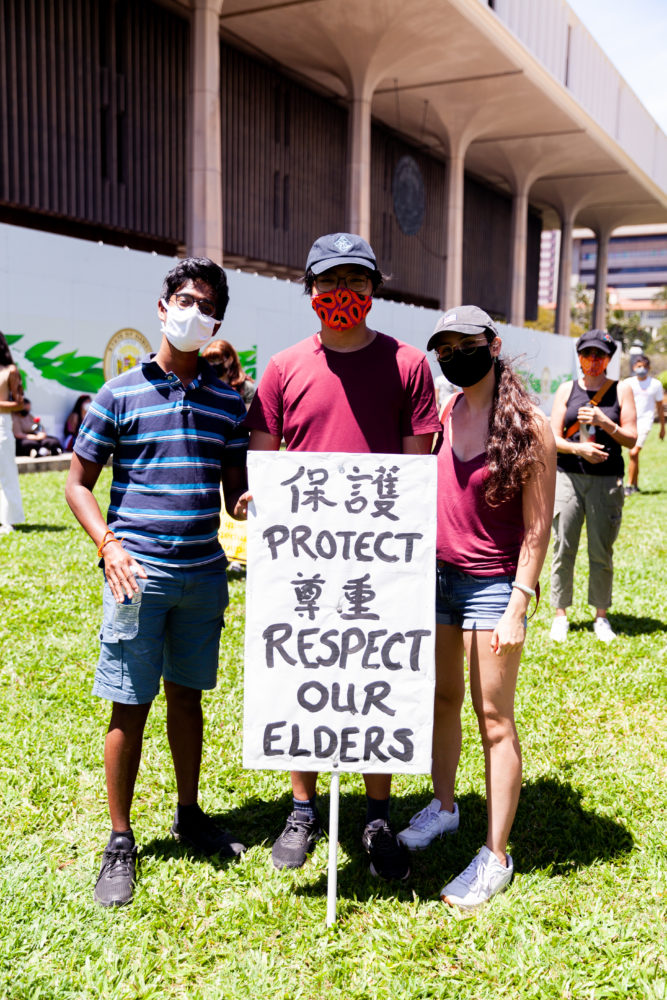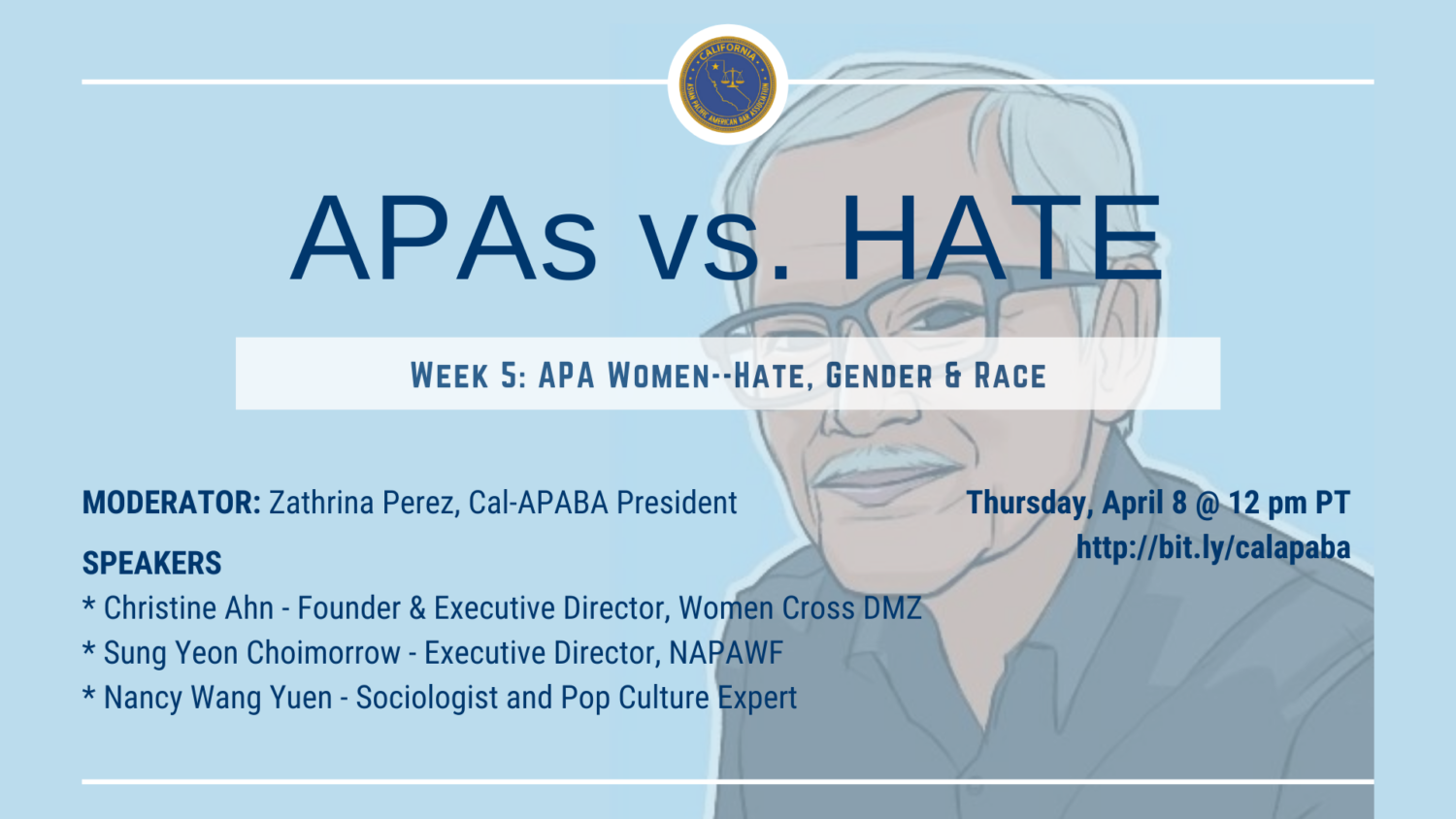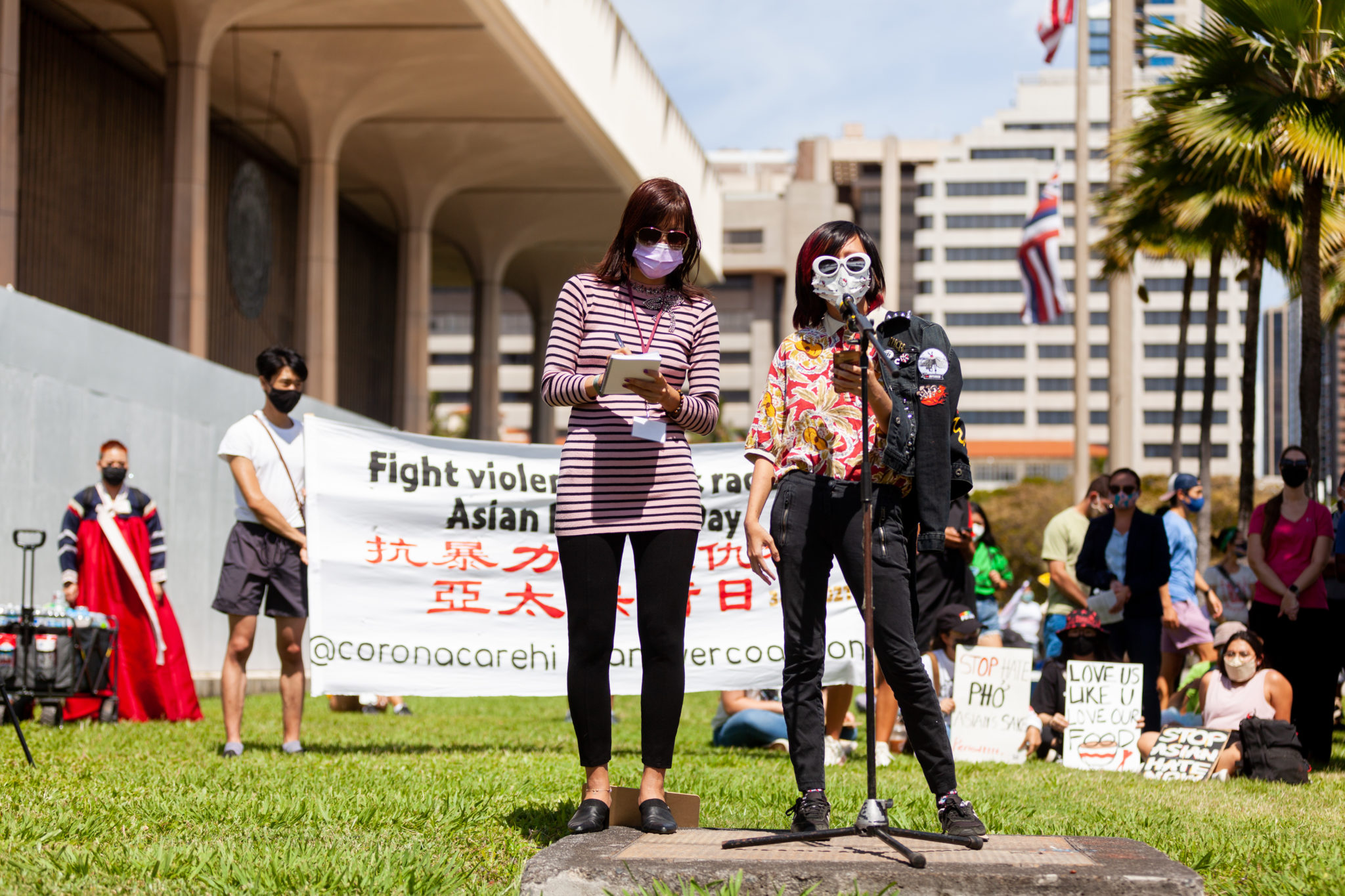Christine Ahn, the founder and executive director of Women Cross DMZ, explains why bold change now is absolutely necessary.
On March 16, I had dinner with my friend Ye Nguyen, a Vietnamese American midwife and naturopathic physician from the North Shore. Over som tum and pad see yew, we talked story about our lives as immigrant women fleeing countries that had been at war with the United States. My heart was filled with both love for this wahine who devoted her life to serving women and babies and also deep sorrow for the traumas we inherited from our families due to colonization, war, and migration.
Little did we know that as we reflected on the legacy of war and militarism on our lives, a 21-year-old white man massacred eight people—including six Asian women—at massage parlors in Atlanta. While authorities have denied that race played a factor, many Asian Americans see this attack as directly connected to rising anti-Asian violence across the United States.
And for good reason. By labeling Covid-19 as the “Chinese virus,” President Trump triggered a wave of verbal and physical attacks on Asian Americans. In the last year, the organization Stop AAPI Hate has recorded nearly 4,000 cases of assault against Asians; 70 percent have been directed at women.
Since Atlanta, Xiao Zhen Zie, a 76-year-old Chinese woman, was punched in the face in San Francisco, and in New York City, Vilma Kari, a 65-year-old Filipina, was brutally assaulted by a man who shouted, “You don’t belong here.”
Trump is not the only one responsible for these heinous attacks. Underlying Trump’s blame of Covid-19 on China is the US’s longstanding foreign policy to confront Beijing militarily, economically and politically. Both Democrats and Republicans advocate “confrontation and coercion, aggression and antagonism” to maintain US primacy against China.
The US has 290 military bases encircling China and regularly conducts provocative military exercises, which according to American University professor David Vine, “increases threats to Chinese security and encourages the Chinese government to respond by boosting its own military spending and activity.”
The US’ aggressive military posture towards China is in fact part of the long legacy of US imperialism in Asia and the Pacific. Beginning in the mid-1850s, the US began its imperial march across the Pacific to forcibly open new markets for its rapid industrialization, starting with Japan, and then Korea, and the Philippines. Countless people died as a result. To quote New York Times columnist Thomas Friedman, “The hidden hand of the market will never work without a hidden fist.”
The people of Hawai‘i know this especially well. Once a sovereign nation, Hawai‘i was the starting point for America’s century of imperialism and conquest in the Pacific.
“White settlers, in pursuit of economic profit, conspired with the US military,” explains Dr. Kyle Kajihiro, a longtime de-militarization activist. “Their interests converged under the unifying ideology of white supremacy.”
During the 1800s, white settler merchants profited handsomely from exporting sugar from Hawai‘i to the United States. To ensure the continuation of favorable terms of trade with the US, haole settlers orchestrated a coup with US Marines in 1893 so Hawaiian sugar would not be subject to tariffs.
Soon after, Queen Lili‘uokalani was overthrown, paving the way for Hawai‘i to be annexed as a US territory into eventual statehood.
“When they overthrew the Hawaiian Kingdom, they didn’t do it just to take land from the Hawaiians, to take away our self-governance, our people, or our culture and suppress us,” says Kawena Philips, a Native Hawaiian activist. “They did it so white supremacy would have a base of operations in the Pacific so they could expand their violence into Asian communities.”


The hawkish rhetoric against China will adversely impact all Asians in the United States because most Americans view Asians as a monolithic group.
And that is what happened in the 20th century. As the United States waged wars in Asia against Japan, North Korea and China, Vietnam and Laos, killing and displacing millions, anti-Asian sentiment triggered violence against Asian Americans at home. During WWII, the US government deemed Japanese Americans a national security threat and forced 120,000 of them into concentration camps, and later dropped atomic bombs on Nagasaki and Hiroshima, incinerating more than 200,000 Japanese lives.
In 1950, when China entered the Korean War alongside North Korea, Chinese-owned businesses in the US were attacked. The US dropped over half a million tons of bombs in Korea, leveled entire cities, and used more napalm than during the Vietnam War.
During the Vietnam War, the US splattered more than 20 million gallons of Agent Orange and herbicides over Vietnam, Cambodia and Laos, which led to cancer, birth defects and severe neurological and psychological problems among the people in those countries as well as returning US servicemen and their families. You cannot inflict this kind of brutality against Asians and not expect that this dehumanization won’t have repercussions for Asian Americans.
The impacts of US militarism did not end there, as the US military established permanent bases in places such as South Korea, Okinawa, Philippines, and Guam that remained long after the wars ended. Around these bases sprung up “camptowns,” where a system of military prostitution controlled by the host government and supported by the US military exposed countless Asian women to racial and gendered violence.
Today, the hawkish rhetoric against China will adversely impact all Asians in the United States because most Americans view Asians as a monolithic group. For example, in 1982, amidst the US trade wars with Japan, two white Detroit autoworkers mistook Vincent Chin as Japanese and beat him to death.
As Terry Park, Asian American Studies lecturer at the University of Maryland, said, “We are constantly seen as perpetual foreigners, as never quite belonging to the US, as always being suspicious, and that bulls-eye gets larger when hawkish rhetoric ensues by US administrations.”
Thus, anti-Asian violence is driven by capitalism, enforced by militarism, and justified by racism. In a 1967 speech, Martin Luther King, Jr. noted that “The triple evils of racism, economic exploitation, and militarism” were the greatest threats facing humanity. “The great problem and the great challenge facing mankind today is to get rid of war.”
And that remains our challenge today. We cannot on one hand decry violence against Asians while at the same time fail to recognize how US foreign policy perpetuates it. If we are to successfully stop the anti-Asian hatred here in the United States, we must end US militarism and wars throughout the Asia-Pacific region.
Hawai‘i—as a site of historical resistance against US imperialism, home of the US Indo-Pacific Command, and the largest Asian and Pacific Islander population nationwide—has a particular role to play. Our voices must rise up to say: We want an end to endless wars, to the Pentagon’s bloated $700 billion budget, and to the 800 US military bases around the world, including right here in these islands. We must cooperate with China to stop the pandemic and future ones, halt climate change, and build a more equitable global future.
Let’s end the longest standing US war with North Korea and the extreme militarization of the Korean Peninsula by signing a peace agreement. Unless we do this, there will be more women like me and Ye who carry the deep trauma of US militarism.
It’s time for the United States to reckon with its imperial past and fundamentally reorient US foreign policy away from racist, patriarchal notions of domination and control. Instead, we must use feminist principles of diplomacy, cooperation, and justice to advance a transformative vision of what makes us secure.
And that means a decolonial, abolitionist future that includes defunding the police and military and redirecting our resources to social services that provide real community safety and security.
This involves building life-affirming coalitions with Kānaka Maoli, the indigenous people of Hawai‘i, and people across the world confronting imperialism and militarized violence so that all our communities can live in peace.
Christine Ahn is the Founder and Executive Director of Women Cross DMZ, a global movement of women mobilizing to end the Korean War and ensure women’s leadership in peace building. Ahn is the International Coordinator of the Korea Peace Now! transnational campaign, which Women Cross DMZ launched in 2019 with three other feminist peace organizations. Christine helped create the Feminist Peace Initiative, which Women Cross DMZ built with MADRE and Grassroots Global Justice Alliance, to reimagine a feminist, movement-driven US foreign policy. She is the recipient of the 2020 US Peace Prize for her bold activism to end the Korean War, heal the wounds from the war, and women’s leadership in peacebuilding.
Christine Anh will be speaking on Thursday, April 8 at 9am HST for the California Asian Pacific American Bar Association on APAs vs. Hate: Hate, Gender and Race, speaking about US foreign policy alongside experts that will discuss the long history of anti-Asian racism and hypersexualization of Asian women




